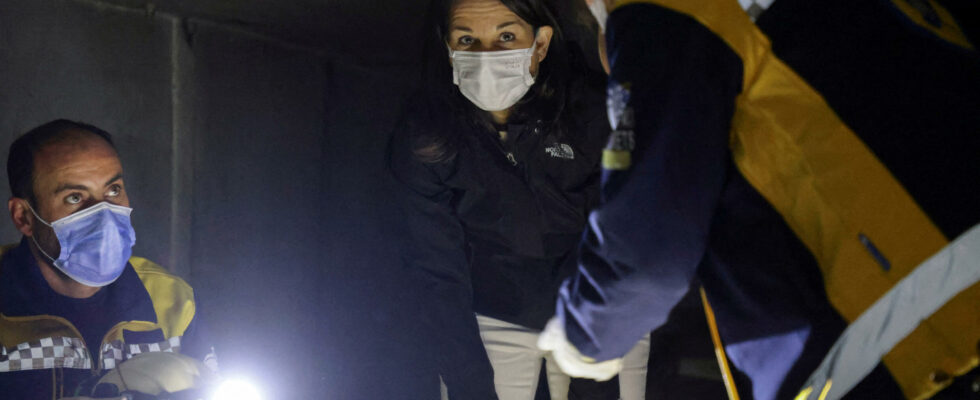In less than four weeks, the new Syrian leaders have managed to be accepted as acceptable interlocutors by many countries. This is evidenced by the visit, Friday January 3 to Damascus, of the heads of German diplomacy Annalena Baerbock and French diplomat Jean-Noël Barrot. They notably met the country’s new strongman, Ahmed al-Charaa. Both ministers, acting on behalf of the European Union, advocated for a peaceful and inclusive transition in Syria, among others.
5 mins
Call for a peaceful and inclusive transition, call for a political solution with the Kurdish minority of Syriacall for the destruction of stockpiles of chemical weapons inherited from the regime Bashar al-Assad… In Damascus, the two heads of diplomacy outlined their expectations, which are also those of the 27 countries of theEuropean Union.
The meeting was the first at this level between officials from major Western powers and Ahmed al-Charaa, who took power on December 8, after the flight of President Assad. Jean-Noel Barrot and Annalena Baerbock, whose visit comes under a mandate from the European Union, met with the leader de facto from Syria to the imposing presidential palace overlooking Damascus, where Assad received his guests.
There France and theGermany want “ promote a peaceful transition and demanding in the service of Syrians and for regional stability “, affirmed Jean-Noël Barrot on X. “ A better future for Syria means an inclusive and peaceful transfer of power, reconciliation and reconstruction “, Annalena Baerbock told the press after the meeting with the new Syrian leader. “ It is now necessary to establish a political dialogue including all ethnic and religious groups and including all citizens, that is to say in particular also the women of this country “, she added.
French Foreign Minister Jean-Noel Barrot calls for “destruction of chemical arsenal” in Syria
Visits at a breakneck pace
Expectations, but no conditions: overall, the new Syrian power encounters very little resistance. Arab diplomats and Westerners – including Americans – follow one another at a frantic pace in the official buildings which until now belonged to the regime of Bashar al-Assad.
Such eagerness is likely due to the desire to help stabilize the country and its regional neighborhood. The new Syria undoubtedly also whets the appetites of countries seeking influence in the Middle East.
Coming from an Islamist guerrilla movement, the new masters of Damascus were able to quickly establish themselves as players who could be visited even in the West. It remains to be seen what use they will make of this political credit.
Also readSyria: why the head of diplomacy chose Saudi Arabia for his first trip
So that the Kurds “ are fully integrated into this political process »
Faced with the challenge of unifying the country, Ahmed al-Charaa pledged to dissolve the armed factions, notably the group HTS. He announced his intention to convene a national dialogue, without specifying the date or who would be invited, and indicated that organizing elections could take four years.
The head of French diplomacy met religious representatives of the Christian community, figures from civil society and spoke with the military leader of Kurds. He has echoed their concerns since the Islamists came to power. “ A political solution must be found with France’s allies, the Kurds, so that they are fully integrated into this political process which is underway today. “, he said.
On the eve of his visit, Jean-Noël Barrot had a meeting with the leader of the Syrian Democratic Forces (FDS, dominated by the Kurds), Mazloum Abdi, who control large parts of northeast Syria.
His German counterpart also estimated that “the involvement of all groups in the political process is essential, as is the security of the Kurds “. She called for “serious security guarantees for the Kurds, as well as the integration of Kurdish forces » in the new army.
Jean-Noël Barrot also announced that France had proposed the organization of an international conference at the end of January, “ involving Syria and its partners » to support the political transition « in the right direction “. And he offered his country’s and the EU’s expertise to help Syrians draft a new Constitution.
Also readSyria: could Ahmed al-Charaa’s message of openness towards minorities mark a turning point?
Visit to Saydnaya Prison
During their visit, the French minister and his German counterpart also visited Saydnaya prison, a symbol of the mass repression of Bashar al-Assad’s power. Accompanied by members of the White Helmets, Syrian rescue workers, they visited underground cells and jails where detention conditions were inhumane and where many detainees died under torture.
According to the Association of Detainees and Missing at Saydnaya Prison, more than 4,000 detainees were released there on the day Damascus fell to rebels.
